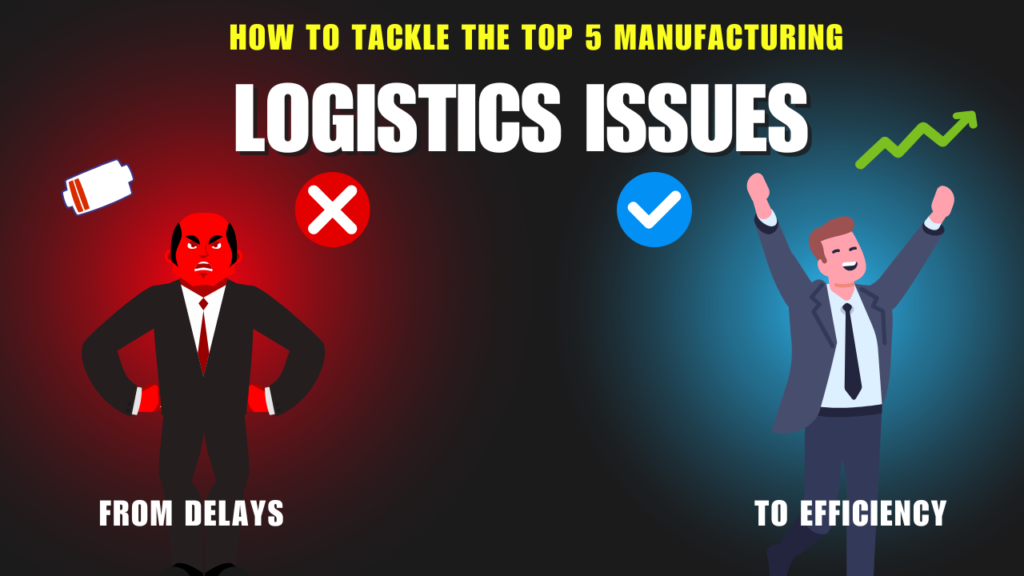
Introduction:
In today’s competitive manufacturing landscape, logistics plays a vital role in determining a company’s success. From sourcing raw materials to delivering finished goods, efficient logistics ensure seamless operations. However, this process is not without its challenges. According to industry studies, logistics costs can account for up to 15% of a manufacturing company’s total expenses, making it a critical area to optimize. Let’s explore the top five logistics challenges in the manufacturing sector and practical ways to overcome them.
Let's break down the logistics issues:
Supply Chain Disruptions:
Global supply chains are prone to disruptions, whether due to natural disasters, geopolitical issues, or sudden demand spikes. These disruptions can lead to delays in production and delivery, directly affecting the manufacturing cycle. Research indicates that 84% of companies have experienced at least one supply chain disruption in the past year, causing significant production delays.
Solution:
To mitigate these risks, manufacturers should diversify their supplier base and implement real-time supply chain monitoring systems. This helps identify bottlenecks early and adapt quickly to changing circumstances.
Inventory Management:
Balancing inventory levels is a constant struggle in manufacturing. Overstocking leads to high holding costs, while stockouts can halt production and delay order fulfillment. Studies show that 43% of small businesses either have too much or too little inventory at any given time, affecting cash flow and customer satisfaction.
Solution:
Implement an integrated inventory management system that uses data analytics to forecast demand accurately. This will help maintain optimal inventory levels, reducing both costs and risks of stockouts.
Cost Optimization:
Rising logistics costs, including fuel prices, warehousing, and transportation expenses, are a major concern for manufacturing companies. According to industry data, transportation costs alone can make up 50-60% of total logistics expenses. These costs can eat into profits and make products less competitive in the market.
Solution:
Optimize logistics routes using advanced software to reduce fuel consumption and transportation costs. Also, consider consolidating shipments and using automated warehousing systems to reduce labor expenses.
Technology Integration:
Incorporating modern technologies like AI, IoT, and data analytics into logistics can be overwhelming. Many manufacturers find it challenging to transition from traditional methods to digital solutions. Despite this, companies that have adopted AI in their logistics operations report a 15-20% increase in productivity.
Solution:
Start small by implementing easy-to-adopt technology solutions that align with your company’s current needs. Gradually scale up to more advanced systems as the workforce becomes comfortable with the new tools.
Skilled Workforce Shortage:
Finding skilled logistics professionals who can handle complex operations efficiently is a significant challenge. According to a recent industry survey, 70% of manufacturing companies face difficulty in sourcing qualified logistics personnel, which can slow down production and impact overall performance.
Solution:
Invest in employee training and development programs focused on enhancing logistics skills and adopting new technologies. Upskilling your current workforce can help bridge the skills gap, improving productivity and efficiency.
Outsource Your HR Process for Optimal Results:
If managing recruitment and training in-house feels overwhelming, outsourcing your HR processes can be a great solution. At efficacyAMS, we specialize in managing logistics challenges faced by manufacturing companies. Our tailored solutions in FG warehouses, RM stores, and quality inspection services ensure your operations run smoothly. With our expertise, you can overcome these hurdles and achieve efficient, cost-effective logistics processes.
Conclusion:
In the ever-evolving manufacturing industry, efficient logistics is key to staying ahead of the competition. By addressing these challenges head-on and partnering with experts like efficacyAMS, companies can streamline their processes, reduce costs, and drive growth.

